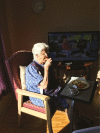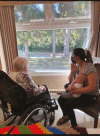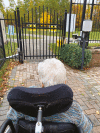"Picturing a Way Forward": Strategies to Manage the Effects of COVID-19-Related Isolation on Long-Term Care Residents and Their Informal Caregivers
- PMID: 36999914
- PMCID: PMC10733125
- DOI: 10.1093/geront/gnad035
"Picturing a Way Forward": Strategies to Manage the Effects of COVID-19-Related Isolation on Long-Term Care Residents and Their Informal Caregivers
Abstract
Background and objectives: Strategies to manage the coronavirus disease 2019 (COVID-19) pandemic included widespread use of physical distancing measures. These well-intended strategies adversely affected long-term care (LTC) residents' socialization and their caregiving arrangements, leading to exacerbation of social isolation and emotional distress for both residents and their caregivers. This study aimed to understand how these measures affected informal caregivers of people living in LTC homes in Ontario. Strategies to increase socialization and promote social connection during and post-COVID-19 were also explored.
Research design and methods: This qualitative study used descriptive and photovoice approaches. Of the 9 potential caregivers identified, 6 participated in the study and shared their experiences and photographic reflections in virtual focus group sessions.
Results: Findings highlighted the increased social isolation experienced by people living in LTC and their caregivers during COVID-19. Caregivers reported pronounced declines in residents' well-being and were frustrated by challenges connecting with their family members during quarantine. Attempts made by LTC homes to maintain social connections, such as window visits and video calls, did not fulfill the social needs of residents and their caregivers.
Discussion and implications: Findings underscore a need for better social support and resources for both LTC residents and their caregivers going forward to prevent further isolation and disengagement. Even in times of lockdown, LTC homes must implement policies, services, and programs that promote meaningful engagement for older adults and their families.
Keywords: COVID-19; Caregiving; Long-term care; Older adults; Photovoice; Socialization.
© The Author(s) 2023. Published by Oxford University Press on behalf of The Gerontological Society of America.
Conflict of interest statement
None declared.
Figures
References
-
- Boamah, S. A., Dal Bello-Haas, V., Weldrick, R., Durepos, P., & Kaasalainen, S. (2021). The cost of isolation: A protocol for exploring the experiences of family caregivers. Social Science Protocol, 4, 1–9. doi: 10.7565/ssp.2021.v4.6190 - DOI
-
- Boamah, S. A., Yous, M. L., Weldrick, R., Havaei, F., & Ganann, R. (2022). Using photovoice as a method for capturing the lived experiences of caregivers during COVID-19: A methodological insight. International Journal of Qualitative Methods, 21, 16094069221137494. doi: 10.1177/16094069221137494 - DOI - PMC - PubMed
Publication types
MeSH terms
Grants and funding
LinkOut - more resources
Full Text Sources
Medical






